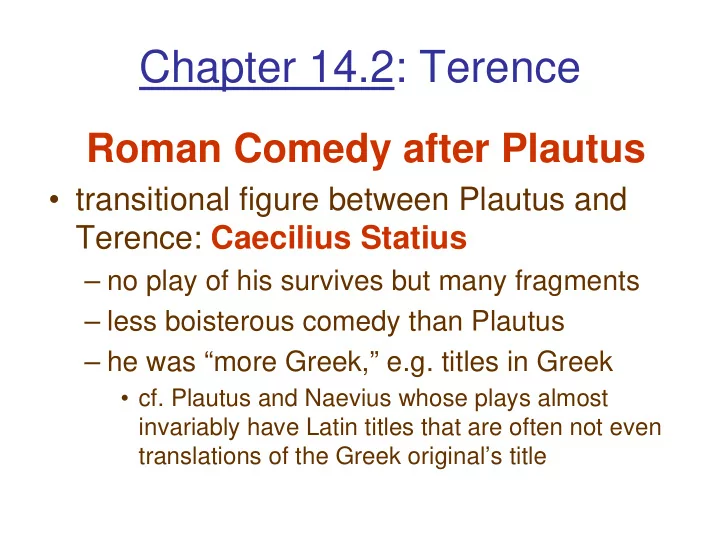

Chapter 14.2: Terence Roman Comedy after Plautus • transitional figure between Plautus and Terence: Caecilius Statius – no play of his survives but many fragments – less boisterous comedy than Plautus – he was “more Greek,” e.g. titles in Greek • cf. Plautus and Naevius whose plays almost invariably have Latin titles that are often not even translations of the Greek original’s title
Chapter 14.2: Terence Publius Terentius Afer • Caecilius Statius reportedly heard the young Terence read his first play ( Andria ) • “Publius Terentius Afer” was apparently his real name, even though he was a slave – cf. Livius Andronicus – supported by aristocrats, e.g. the Scipios • his dates are uncertain: born ca. 195-185 BCE and died soon after 160 BCE
Chapter 14.2: Terence Terence’s Drama • every play he wrote survives in full! – shows the high esteem in which he was held in antiquity and ever after — until our age! – we can track his career better than any other ancient playwright, including Sophocles • his plays were produced at a variety of festivals, including state funerals – e.g. Adelphoe which premiered at Aemilius Paullus’ funeral in 160 BCE
Chapter 14.2: Terence Terence’s Drama • Julius Caesar wrote a treatise on Terence’s sermo purus (“clean dialogue”) • Saxon canoness Hrotsvit (or Hrotswitha ) imitated the language of Terence’s dramas – but she celebrated Christian virgins • more than 600 Terence manuscripts survived the Middle Ages
Chapter 14.2: Terence Terence’s Drama • also, scholia are attached to all of Terence’s comedies, cf. Aristophanes – but A’s scholia elucidate historical context – conversely, Terence’s scholia discuss the nature of his drama, which shows how important Terence was as a Roman author • some of these scholia are from the hand of Aelius Donatus , St. Jerome’s teacher
Chapter 14.2: Terence Terence’s Prologues • among the most important features of Terence’s work are the prologues prefixed to all six of his comedies – Terence speaks to us directly in his own voice – cf. the parabases of Aristophanes’ comedies • but Terence doesn’t discuss current politics, instead theatre-related issues – e.g. playwriting, producing plays
Chapter 14.2: Terence Terence’s Prologues • e.g., the prologue of Andria mentions the complaints of a “malevolent decrepit poet” – Donatus: Luscius Lanuvinus • also raises the issue of contaminatio – “pollution”; lit. “touching together” – i.e. mixing two different Greek originals in one Roman adaptation • growing independence of Roman playwrights?
Chapter 14.2: Terence Terence’s Prologues • why was contaminatio an issue? – were there too few Greek originals available? – was it a matter of excessive “Hellenism,” which dictated that Menander’s drama shouldn’t be tampered with? • n.b. Terence “contaminated” all his plays – e.g. Adelphoe : scene from Diphilus inserted into Menander comedy
Chapter 14.2: Terence Terence’s Prologues • prologue of Hecyra (“Mother-in-law”) notes difficulties in staging this comedy – based on an original by a Greek imitator of Menander: Apollodorus of Carystus – twice interrupted by crowds interested in other things (boxing match, gladiators, etc.) – shows the Romans’ basic inclination toward “popular entertainment”
Chapter 14.2: Terence Terence and Menander • n.b. the all-but-total victory of Menander over his rivals (Diphilus, Philemon, etc.) • Terence’s drama includes some of the best examples of Menander’s formula for success: the humane treatment of character-types, esp. sympathetic “fools” – Thraso ( The Eunuch ) – Micio ( Adelphoe , “The Brothers”)
Chapter 14.2: Terence The “Roman” in Roman Comedy • the Romans’ only known innovation in theatre is dramatic suspense – no statement at the beginning of the play telling the audience the resolution of the plot – e.g. the end of the prologue of Adelphoe : So, don't expect to hear the plot of the play here. The old men who come on first will reveal it, some of it, The action will unveil the rest.
Chapter 14.2: Terence The “Roman” in Roman Comedy • why did the Romans invent dramatic suspense? – better, why didn’t the Greeks? • the Greeks needed to feel superior to the play, whereas the Romans did not – part of the Romans’ general attitude that a play is a ludus (“playtime”)
Recommend
More recommend